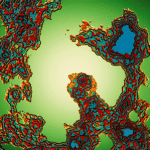Many parallels exist between cannabis and psychedelics. Among them are the diverse therapeutic effects for which both classes of drugs are now being investigated, from fighting pain and inflammation to aiding treatment of some psychiatric disorders. Also on the list: Alzheimer’s Disease, the most common neurodegenerative disease with as many as 6.2 million Americans living with the condition. (The next most prevalent is Parkinson’s Disease at 1.2 million.)
On the psychedelic front, a review article published last year in the journal Frontiers in Synaptic Neuroscience1 makes a strong case for LSD and psilocybin as potential treatments for this progressively disabling condition. A study now underway at Johns Hopkins University’s Center for Psychedelic and Consciousness Research and another published in 20192 by psychedelic medicine company Eleusis signal serious interest in Alzheimer’s among the field’s heavy hitters.
And in the world of cannabis science, the plant has been studied as a potential treatment for Alzheimer’s Disease since at least the turn of the century. Today interest in the subject is higher than ever. The scientific publisher Frontiers recently issued a call for papers on “targeting the endocannabinoidiome in neurodegenerative disorders,” recognizing the subject as a “hot research area.” (The term “endocannabinoidome” refers to the expanded endocannabinoid system, including additional mediators, enzymes, and molecular targets.)
In September 2021 alone, three papers appeared in the scientific literature summarizing much of what’s known about Alzheimer’s Disease and the endocannabinoid system.
CBD for Alzheimer’s Disease
An article published in the journal Brain Sciences3 reviews how the endocannabinoid system (ECS) may be involved in the development of Alzheimer’s Disease – and how cannabidiol (CBD) and other cannabinoids may be used to help treat it. The discussion gets quite technical, but here are the authors’ highlights of what the science from the last couple decades suggests:
- Postmortem analysis has revealed changes to several components of the ECS in the brains of Alzheimer’s patients. Expression of CB1 cannabinoid receptors is decreased, while expression of CB2 receptors is markedly increased in the frontal or parahippocampal cortex, “probably in a time-dependent manner.”
- Increased expression of CB2 receptors is pronounced in and around amyloid plaques (aggregates of abnormally configured proteins that are considered a hallmark of Alzheimer’s Disease and cognitive decline), indicating a correlation between the ECS and plaque deposition.
- Expression of the enzymes FAAH [fatty acid amide hydrolase] and MAGL [monoacylglycerol lipase] – which metabolize the endocannabinoids anandamide and 2-Arachidonoylglycerol (2-AG) , respectively – increases in the brains of Alzheimer’s patients. So too does expression of a third key enzyme, DAGL [diacylglycerol lipase], which synthesizes 2-AG.
- Given the modulatory effects of cannabinoids on the ECS, cannabinoids may be good candidates for treating Alzheimer’s Disease. Clinical trials have already reported that cannabinoids might be useful for reducing some symptoms in patients with Alzheimer’s or dementia.
While both THC and CBD offer promise in this respect and are known to be neuroprotective, “the concomitant psychotropic effects of THC pose a problem,” the authors write. (THC’s intoxicating effects are mediated by CB1, though the compound also binds to CB2; CBD does not have a strong affinity for either.) As a result, CBD has attracted increasing attention for its therapeutic potential.
Targeting Cannabinoid Receptor 2 to Treat Dementia
A second recent review, published in the Journal of Neuroscience Research4 in early September, takes a slightly different tack. Instead of focusing on plant cannabinoids, it draws upon many of the same factors linking the ECS with Alzheimer’s Disease to make a case for selectively targeting CB2 (which does not mediate psychotropic effects) when developing novel drugs to treat Alzheimer’s and related conditions.
“In the treatment of neurodegenerative diseases, CB2 agonists have shown promising results,” the India-based authors write. (An “agonist” activates a receptor and causes it to signal, whereas an antagonist blocks the receptor.) “The experimental evidence suggests that they may be useful in the management of Alzheimer’s Disease by reducing inflammation, tau hyperphosphorylation, beta-amyloid aggregation, [and] oxidative stress, and improving cognitive function.”
The paper cites numerous examples of selective CB2 agonists developed and tested for treating pain, arthritis, inflammation, and other conditions by companies including GlaxoSmithKline, Glenmark Pharmaceuticals, Corbus Pharmaceuticals, and Eli Lilly. Thus far, however, medical scientists have not been able to translate early-phase clinical trials involving CB2 agonists into viable, clinically effective pharmaceuticals.
Alzheimer’s & Gut Microbiota
In recent years the gut microbiome has emerged as a fascinating player in human health and disease. Disturbances to this system have been associated with a broad range of adverse outcomes including obesity, cancer, and (you guessed it) neurodegenerative disorders such as Alzheimer’s and Parkinson’s.
Less often addressed in popular accounts of the gut microbiome are its interactions with the endocannabinoid system. As Project CBD explained in a 2020 article, the ECS serves as a sort of bridge between resident bacteria and the body itself, including the brain, by relaying signals back and forth within this symbiotic, mutually beneficial relationship.
In a recent review in the journal Life5 , a team of Italian researchers uses this same metaphor to conceptualize how the ECS may be key to mediating the connection between gut flora dysbiosis and Alzheimer’s physiopathology. The two interacting systems may serve as “common denominators” in the disease, the researchers suggest. “The overlapping roles of the encodcannabinoid system and the microbiome…suggest that a novel approach such as modulating the microbiota via [the ECS] may provide new therapeutic perspectives for treating AD,” they conclude.
Nate Seltenrich, Project CBD contributing writer, is the author of the column Bridging the Gap. An independent science journalist based in the San Francisco Bay Area, he covers a wide range of subjects, including environmental health, neuroscience, and pharmacology. © Copyright, Project CBD. May not be reprinted without permission.
Footnotes
- https://www.frontiersin.org/articles/10.3389/fnsyn.2020.00034/full
- https://doi.org/10.1007/s00213-019-05417-7
- https://www.mdpi.com/2076-3425/11/9/1211/htm
- https://onlinelibrary.wiley.com/doi/full/10.1002/jnr.24933
- https://www.mdpi.com/2075-1729/11/9/934
Recommended Readings
Cannabinoids for Alzheimer’s
Government scientists filed a patent for cannabinoids as antioxidants and neuroprotectants.
THC & CBD for Dementia
A pilot study demonstrates that cannabis extracts can be safely used for symptoms of severe dementia.
Full-Spectrum Brain Boost
The neuroprotective properties of CBD and other cannabis components.










